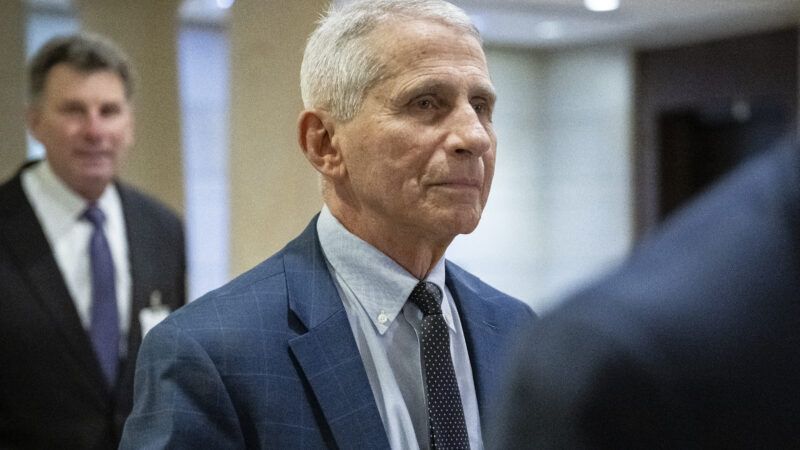Fauci to Congress: 6-Foot Social Distancing Guidance Likely Not Based on Data
Republican lawmakers criticized the former NIH official for playing "semantics" about lab leaks and gain-of-function research during closed-door congressional testimony this week.

In closed-door congressional testimony, former chief White House medical adviser Anthony Fauci said that federal social distancing guidance during the pandemic was likely not based on any data, and conceded that the lab leak hypothesis of COVID-19's origins isn't a conspiracy theory.
Fauci's comments came during the second of two seven-hour rounds of transcribed, but non-public, testimony before the House Select Subcommittee on the Coronavirus Pandemic.
The repeated federal recommendation that people keep six feet of distance between themselves and others "sort of just appeared," said Fauci—the former director of the National Institute of Allergy and Infectious Diseases and former chief medical advisor to President Joe Biden—to lawmakers yesterday, according to a statement released today from the committee's Chairman, Rep. Brad Wenstrup (R–Ohio).
The feds' oft-repeated six-foot rule informed numerous state and local pandemic restrictions, including mask mandates and capacity limitations at businesses. Washington, D.C.'s mask mandate, for instance, required people to wear masks outside when one couldn't reliably keep six feet away from other people.
Fauci also reportedly told lawmakers yesterday that the lab leak hypothesis was not a conspiracy theory.
Early in the pandemic, Fauci and other National Institute of Health (NIH) officials pushed researchers to produce a paper downplaying the possibility COVID-19 had man-made origins.
Last year, the House's Coronavirus subcommittee published emails and other communications showing Fauci's own efforts to downplay the lab leak early in the pandemic and pressure researchers to produce a paper to that effect.
The resulting "Proximal Origins" paper published in March 2020 totally dismissed the lab leak, instead saying that COVID-19 had zoonotic origins. It heavily influenced initial media coverage of the lab leak as a debunked conspiracy. Other communications uncovered by the House subcommittee show the paper's authors candidly saying they were downplaying their assessment of a possible lab leak for political reasons.
Across his two days of testimony, Fauci engaged in "semantics" about the definitions of lab leaks and gain-of-function research—which involves engineering viruses to make them more deadly—to "cover up" his suppression of the lab leak hypothesis and improperly defended his past statements that NIH didn't fund gain-of-function research in Wuhan, China, said Wenstrup.
Sen. Rand Paul (R–Ky.) has called for Fauci to be criminally prosecuted for lying to Congress about NIH's funding of gain-of-function research.
"Dr. Fauci's transcribed interview revealed systemic failures in our public health system," said Wenstrup today. "It is clear that dissenting opinions were often not considered or suppressed completely. Should a future pandemic arise, America's response must be guided by scientific facts and conclusive data."
Rent Free is a weekly newsletter from Christian Britschgi on urbanism and the fight for less regulation, more housing, more property rights, and more freedom in America's cities.


Show Comments (239)